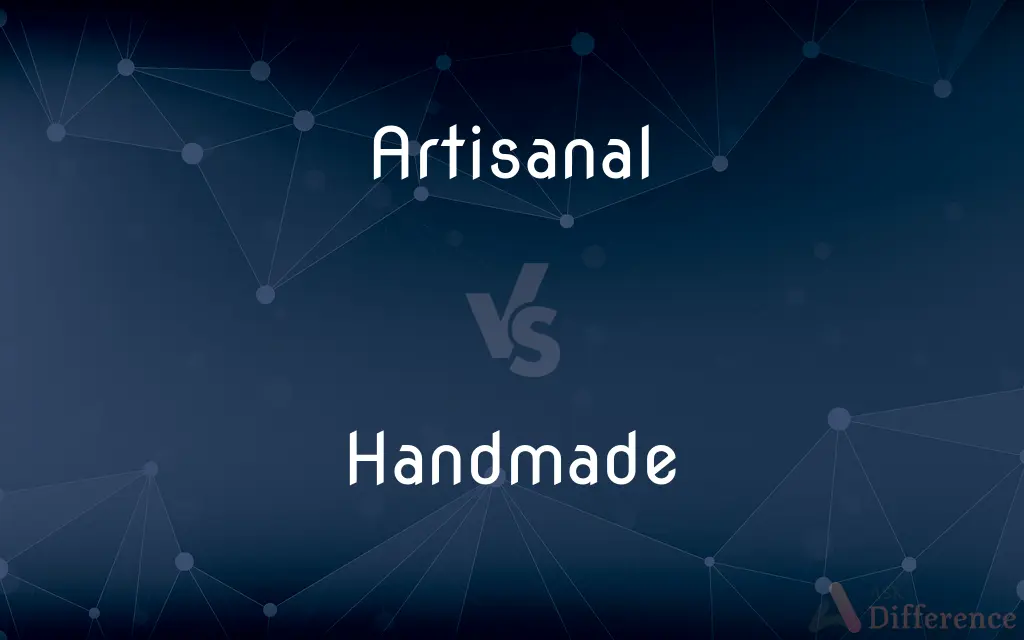Artisanal vs. Handmade — What's the Difference?
By Tayyaba Rehman & Fiza Rafique — Updated on March 20, 2024
Artisanal products are crafted by skilled artisans with a focus on traditional methods, while handmade items are created by hand, not necessarily by an artisan or with traditional techniques.

Difference Between Artisanal and Handmade
Table of Contents
ADVERTISEMENT
Key Differences
Artisanal goods emphasize the role of the artisan and traditional craftsmanship, often incorporating unique designs and high-quality materials. These items are typically produced in small quantities and reflect the cultural heritage and personal touch of the artisan. On the other hand, handmade products are defined by the method of production—made by hand or with the use of basic tools rather than automated machinery.
While artisanal items are often associated with premium quality and higher prices due to the expertise and time involved in their creation, handmade products can vary widely in quality and price, catering to a broader market. Consumers choose artisanal items for their uniqueness and cultural significance, whereas handmade items appeal to those seeking the personal touch and authenticity of something made without mass production techniques.
Artisanal works frequently showcase the distinctive style and signature of the artisan, making each piece a collectible or one-of-a-kind item. Handmade goods, while also unique, might not carry the same level of individual expression or historical context as artisanal items.
The choice between artisanal and handmade can depend on personal values and preferences. Some consumers prioritize the cultural and artistic expression found in artisanal goods, while others value the simplicity and genuineness of handmade items.
Comparison Chart
Definition
Created by skilled artisans, focusing on traditional techniques and craftsmanship.
Made by hand or with basic tools, not mass-produced.
ADVERTISEMENT
Key Feature
Emphasis on the artisan's skill and traditional methods.
Highlight the manual process of creation, regardless of skill level.
Product Range
Often culturally significant items with high-quality materials.
Wide range, including crafts, clothing, and home goods.
Price Range
Typically higher, reflecting the craftsmanship and materials used.
Varies widely, accessible to different budgets.
Consumer Appeal
Valued for cultural heritage, uniqueness, and quality.
Sought for authenticity, personal touch, and ethical production.
Compare with Definitions
Artisanal
Denoting high quality that results from handcraftsmanship.
The artisanal dress featured exquisite hand embroidery.
Handmade
The act of creating something by hand.
The process of making handmade candles involves careful pouring and cooling.
Artisanal
Emphasizing the manual skills and tradition in the production process.
The artisanal approach to bread baking is gaining popularity.
Handmade
Items or products created without the use of automated machinery.
Handmade soaps are a popular gift choice.
Artisanal
Pertaining to or characteristic of an artisan.
The gallery showcases artisanal pottery from local craftsmen.
Handmade
The attractiveness or charm of items made by hand.
There's a special appeal in handmade greeting cards that store-bought ones lack.
Artisanal
The method of making goods by hand, especially when involving traditional techniques.
Artisanal jewelry making involves age-old techniques passed down through generations.
Handmade
Characterizing something as having the authentic touch of being made by hand.
The handmade wooden toys were durable and unique.
Artisanal
Products or goods made in a traditional or non-mechanized way.
Artisanal cheeses are often more flavorful than their mass-produced counterparts.
Handmade
Made by hand, not by machine.
The handmade quilt exuded warmth and comfort.
Artisanal
Of or pertaining to artisans or the work of artisans.
Handmade
Made by hand, not by machine, and typically therefore of superior quality
His expensive handmade leather shoes
Artisanal
Relating to or characteristic of an artisan
Artisanal skills
Artisanal workshops
Handmade
Made or prepared by hand rather than by machine.
Artisanal
Relating to or made by an artisan.
Handmade
Manufactured by hand.
Handmade shoes
Artisanal
Relating to or being a food or beverage made by hand or by traditional methods.
Handmade
An art or craft object made by hand.
Artisanal
Involving skilled work, with comparatively little reliance on machinery.
Handmade
Manufactured by hand; as, handmade shoes. Contrasted with machine-made.
Artisanal
(of an item, especially a foodstuff) Made by an artisan (skilled worker).
Handmade
Made by hand or a hand process;
Delicate handmade baby dresses
Common Curiosities
What makes a product artisanal?
A product is artisanal if it's made by skilled artisans using traditional techniques and craftsmanship.
Can a product be both artisanal and handmade?
Yes, many artisanal products are also handmade, as they are crafted by hand using traditional methods.
Can handmade products be customized?
Yes, one of the benefits of handmade products is the potential for customization, as the creator can often tailor the item to specific preferences.
Why do people choose handmade products?
People choose handmade products for their authenticity, personal touch, and the unique qualities that come from something being made by hand.
Is there a certification for artisanal or handmade products?
Some regions and organizations offer certifications, but standards vary. Consumers often rely on the artisan's or seller's word and reputation.
Are all artisanal products unique?
While not all are one-of-a-kind, artisanal products often have unique aspects due to the manual process and individual skill of the artisan.
Are artisanal products more expensive than handmade products?
Often, yes, because artisanal products require skilled labor and may use high-quality materials.
What is the difference between artisanal and commercial products?
Artisanal products are made in small quantities using traditional methods, while commercial products are mass-produced using automated processes.
How do I know if a product is truly handmade?
Look for information on how the product is made, the materials used, and the story behind its creation, which can often indicate a genuine handmade item.
Can artisanal or handmade products be found online?
Yes, many platforms and websites specialize in selling artisanal and handmade products, connecting artisans with a global customer base.
What challenges do artisanal and handmade product makers face?
Challenges include competition with mass-produced items, securing materials, and reaching a wider audience without compromising their craft's authenticity.
Why are artisanal skills important?
They preserve traditional crafts and cultures, offer employment opportunities, and contribute to the diversity of products available in the market.
How can I support artisanal and handmade products?
Purchasing directly from artisans or through markets that specialize in such goods supports these creators and their crafts.
What are the benefits of buying artisanal goods?
Benefits include supporting skilled labor, preserving cultural heritage, and owning a piece of art with a story.
Do handmade items have a lower environmental impact?
Handmade items can have a lower environmental impact due to smaller scale production and less reliance on heavy machinery.
Share Your Discovery

Previous Comparison
Secretary vs. Secretory
Next Comparison
Seminar vs. PresentationAuthor Spotlight
Written by
Tayyaba RehmanTayyaba Rehman is a distinguished writer, currently serving as a primary contributor to askdifference.com. As a researcher in semantics and etymology, Tayyaba's passion for the complexity of languages and their distinctions has found a perfect home on the platform. Tayyaba delves into the intricacies of language, distinguishing between commonly confused words and phrases, thereby providing clarity for readers worldwide.
Co-written by
Fiza RafiqueFiza Rafique is a skilled content writer at AskDifference.com, where she meticulously refines and enhances written pieces. Drawing from her vast editorial expertise, Fiza ensures clarity, accuracy, and precision in every article. Passionate about language, she continually seeks to elevate the quality of content for readers worldwide.
















































